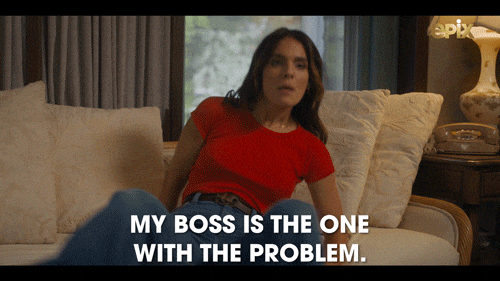I built a 20-year HR career from temp to executive. Here's how being 'the quiet leader' became my superpower.
Cindy Wilson on why authentic leadership doesn't always mean being the loudest voice in the room
This as-told-to essay is based on a conversation I had with Cindy Wilson, a strategic HR leader based in Trinidad. She recently resigned as Executive Manager - HR at Angostura Limited, where she oversaw HR strategy and organisational development. Subscribe now to get more stories like this in your inbox.
What we cover in this story
How introverted traits can become leadership strengths
Transforming listening skills into measurable business impact
Making tough decisions while preserving dignity
Building trust through consistency and authentic leadership
Practical lessons for navigating organisational relationships

The big picture: When I started as a temp at a recruitment agency during university, I had no clear career direction. Twenty years later, I’ve learned that thoughtful observation and deep listening aren’t just personality traits — they’re leadership superpowers that have helped me transform organisations and touch lives in unexpected ways.
Why it matters: Corporate culture often celebrates outgoing personalities, but:
Traditional leadership models overlook the power of quiet influence. Many organisations mistake volume for impact, missing how deep listening and thoughtful action can drive more sustainable change.
Many talented professionals get stuck trying to fit the extroverted leader stereotype. They focus on being seen and heard, while missing opportunities to build trust through observation and strategic action.
The most successful leaders understand that authenticity trumps personality type. They know when to listen, when to act, and most importantly, how to balance being kind with making tough decisions that serve the greater good.
My journey into HR began unexpectedly, but I discovered early that listening could be a superpower
What happened: My journey into HR started unexpectedly when my mother’s friend, who owned a recruitment agency, invited me to help with clerical work during school holidays. What began as basic admin work evolved into coordinating interviews, sitting in on them, and eventually running recruitment projects independently.
Being “the quiet one” became an advantage: Friends, classmates, and colleagues would naturally share personal struggles with me. I wasn’t the loudest voice in the room, but I would listen. Initially, I even considered becoming a psychologist, drawn to understanding people’s motivations and challenges.
Understanding people became my focus when I realised that while I couldn’t pursue psychology without the science background, HR fulfilled that same calling. It allowed me to work closely with people, understand their motivations, and help them achieve their goals — while driving business results.
Two contrasting managers shaped my leadership philosophy
What happened: Early in my career, I experienced two vastly different management styles that would define my approach to leadership.
The first manager taught me what not to do through their hypercritical style focused on every mistake, delivering feedback that felt personal and harsh. My confidence plummeted, and I began second-guessing every decision, which only made things worse.
The second manager showed me effective leadership by providing support, constructive feedback, and guidance while still holding me accountable. This experience taught me that leadership isn’t about controlling others — it’s about creating an environment where people feel empowered to do their best work.
These early lessons in management style guided my approach to leading teams at ANSA McAL Automotive
What happened: At ANSA McAL Automotive, I had the opportunity to prove that quiet leadership could drive significant results.
Employee engagement soared through careful observation and strategic action, increasing from 56% to 83% over six years. More importantly, we maintained a 90% retention rate for high performers.
Trust became my metric when I realised success wasn’t just about numbers. A sales representative’s performance had been declining, and instead of just addressing the metrics, I checked in with him. During our conversation, he opened up about his wife’s terminal illness — something he hadn’t shared with anyone else. Years later, he called to thank me for that conversation, sharing that it had prevented him from making a devastating personal decision.
Learning to make tough decisions with compassion
What happened: As I advanced into more senior roles, I developed a unique framework for decision-making that balanced individual needs with organisational sustainability.
The “500 times” rule became my guide when making decisions. Before making any exception or decision, I ask myself if I could repeat this action across the organisation. If making an exception for one employee would cripple the company when applied to everyone, it’s probably not the right decision. Sometimes you can make exceptions, but you need to clearly understand what triggers justify that exception and how it impacts the collective good.
Dignity became non-negotiable throughout my career, as I’ve had to terminate many people, but I’ve always tried to do it in a way that is respectful to them, so they can still leave with some level of dignity. It’s not about the individual in the moment — it’s about understanding that without a sustainable business, people don’t have jobs.
Building trust through consistent action
What happened: Throughout my career, I’ve learned that authenticity builds deeper trust than charisma.
Authenticity proved more valuable than charisma since I’m not the quintessential HR person — very smiley, happy, bubbly. I am quite reserved, always observing, and eventually, when you get to know me, extremely compassionate and caring and supportive. But it may take some time for people to get to know that side of you, especially when you’re observing them.
Real impact comes from small moments, as a young man I hired as a line operator later told me he had just $2 to his name when I gave him that opportunity. What seemed like a routine hiring decision had allowed him to eat and get back on his feet. These moments remind me that HR isn’t just about policies — it’s about changing lives.
Why HR excellence requires more than common sense
What happened: Throughout my career, I’ve seen many underestimate what it takes to excel in HR, viewing it as less rigorous than fields like accounting or engineering.
Theory provides crucial foundations because while HR might seem like “just common sense,” there’s real science behind it. My certifications and formal education gave me frameworks for understanding human behavior, organizational dynamics, and strategic workforce planning. These aren’t just academic exercises — they’re tools that shape how I approach complex challenges.
Experience transforms theory into practice when no textbook can tell you exactly how to motivate someone or handle a specific situation. The real skill comes in knowing when and how to apply different approaches. Each interaction is unique, and success comes from being able to adapt theoretical knowledge to real-world scenarios.
Continuous learning is non-negotiable with workplace dynamics constantly evolving. Staying current is crucial. I invest time in webinars, industry associations, and reading about both HR and business trends. This broader perspective helps ensure our people strategies align with where business is heading, not just where it’s been.
All these lessons in authentic leadership culminated in my role as Executive Manager HR at Angostura, where I could fully implement my philosophy on a larger scale
What happened: Taking on the Executive Manager HR role at Angostura presented an opportunity to combine all my learnings about quiet leadership with strategic business impact.
Restructuring with purpose meant we’ve completely realigned our leadership team, introducing key roles that support our long-term strategy. This wasn’t just about moving boxes on an org chart — it required deep understanding of our business needs and careful attention to team dynamics.
Leading with data involved implementing balanced scorecard methodologies and pioneering HR analytics reporting, we’re making more informed decisions about our people strategies. This has improved key metrics like employee cost as a percentage of revenue and helped us achieve 100% retention of high performers.
Building sustainable systems became our focus rather than quick fixes, as we’ve concentrated on creating lasting change through comprehensive talent management processes. This systematic approach ensures we’re not just solving today’s problems but building capability for tomorrow’s challenges.
The payoff comes in unexpected ways
What happened: Years after leaving various roles, I still receive calls and messages from former employees sharing how our interactions impacted their lives.
Small actions have lasting impact as I discovered during a chance grocery store encounter with a former employee. He revealed how giving him his first opportunity had launched his career. Another called years later to thank me for a conversation during his wife’s illness. These moments remind me that HR work, though often thankless, can profoundly impact lives.
Trust builds over time when people see consistent, ethical leadership. They remember. Even tough decisions, when handled with dignity and respect, can build lasting trust.
My advice for aspiring HR leaders
What works: After nearly two decades in this field, I’ve learned that effective leadership isn’t about personality type — it’s about approach:
Distinguish between being nice and being kind as being nice often seeks approval and avoids conflict, while kindness is rooted in empathy, honesty, and constructive support — even when the message is hard to deliver. Leadership isn’t about being the ‘fun boss’ — it’s about building trust through steadiness, humility, and ethical decision-making.
Use conflict as a growth tool because conflict is an inherent part of collaboration. It need not be detrimental; it can serve as a catalyst for personal development and team cohesion. The key is learning to navigate it productively rather than avoiding it.
Making an impact in your role
What I’ve learned: Leading HR requires balancing immediate needs with long-term impact:
Listen more than you speak because underperformance often has hidden causes. You need to understand what’s going on with people rather than creating a narrative about why they may not be functioning. When you take time to really listen, you often discover the real issues affecting performance.
Drive culture change through consistency because cultural transformation isn’t about grand gestures. It’s like a drum that you’re repeatedly beating. Whether it’s core values, employee events, or policies, every single interaction must consistently reinforce the desired culture. When people see inconsistency, trust erodes.
Focus on sustainable solutions by considering both the organisation and its people. Without a business, people don’t have jobs, but without engaged employees, the business can’t thrive. Every decision must balance these realities for long-term sustainability.
The bottom line: Success in HR leadership isn’t about fitting a charismatic stereotype — it’s about consistent, thoughtful action that puts people first while serving organisational needs.
For aspiring HR leaders: HR isn’t just common sense. It requires understanding the science behind people management while recognising that each situation is unique. Real expertise comes from combining theoretical knowledge with practical experience.
For organisations: The loudest voice isn’t always the most impactful. Look for leaders who can build trust through consistent action and thoughtful decision-making.
For quiet professionals: Your natural tendency to observe, listen, and think deeply isn’t a limitation — it’s a superpower that can transform organisations and touch lives. Use it intentionally and confidently.








Very insightful. I just wish others can take a page from your vast experience and observations. Proud beyond words.
This was very refreshing to read. I've seen people overlooked solely on the basis of their introverted personalities. It's good to see these introverted traits presented with strength in them.